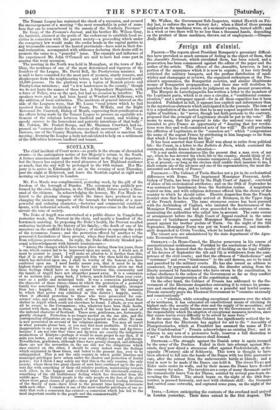SCOTLAND.
The chief incident of Court news—so gentle is the stream of chronicled events—is the anticipatory notice of ber Majesty's return to the South. A former announcement named the 5th instant as the day of departure ; but the Queen has enjoyed the rural pleasures of her Highland residence no much, that the stay will be prolonged to the 10th instant. Her Ma- jesty is to arrive in Edinburgh at six in the evening of next Thursday, pass the night at Holyrood, and leave the Scottish capital at eight next morning on her journey to London.
Mr. Fox Maule was complimented, yesterday week, by the gift of the freedom of the borough of Dundee. The ceremony was publicly per- formed by the civic dignitaries, in the Thistle Hall, before nearly a thou- sand of the citizens. In acknowledging the honour, Mr. Fox Maule re- ferred to the pleasing change which the times have produced in ex- changing the ancient ramparts of the borough for bulwarks of a more powerful and enduring character,—factories and commercial establish- ments, with industrial schools, well fitted to repress crime in the bud and elevate the tone of society.
The Duke of Argyll was entertained at a public dinner in Campbelton yesterday week; the Provost in the chair, and nearly a hundred of the townsmen assisting. In proposing the Duke's health, the Provost recalled endearing incidents in the history of his family,—the death of one of his ancestors on the scaffold for his religion; of another in opposing the yoke of the tyrannous James ; and the protection offered by another to the persecuted forefathers of those present, when they found no other refuge from religious persecution. In reply, the Duke effectively blended per- sonal acknowledgment with historic reminiscence-
" Among the changes which have taken place during these ten years, there is one which cannot fail to be impressed upon my mind, as, I doubt not, it must be present to yours. I will make no allusion to it further than this, that if in my after life I shall approach him who then held the position which has devolved upon me, I shall be worthy of the honour you have conferred upon me. I need hardly assure you, that it must be in the highest degree gratifying to me to have any indication given me that those feelings which have so long existed between this community and the family of Argyll have not altogether passed away. It is a connexion of no modern date; going back, I believe, much further than your exist- ence as a public and municipal body. It was a connexionpartaking of the character of those times—times in which the protection of pa powerful family was sometimes happily, sometimes no doubt unhappily, stronger than law • happily, I think you will agree with me, in the instances i in which 'that power was exhibited in this district ; happily, surely, when it afforded protection to those who were persecuted for con- science' sake, and who, amid the wilds of these Western waves, found that shelter in Argyll which could not elsewhere be found. I allude, as you must all be aware, to the Covenanters; who, whatever have been their faults, carried with them, and in them, much of the very best bone and sinew of the national character of Scotland. Times now, gentlemen, are, fortunately, greatly changed. Protection is no longer needed on the one side, and the corresponding obligations are no longer to be expected on the other. No man is now persecuted on account of his religious opinions. You may all resort to what pursuits please best, or you may find most profitable. It would be inappropriate to say you may all live under your own vines and fig-trees; because I am not sure that vines and fig-trees are exactly the indigenous Productions of Kintyre—perhaps it would be more proper to say that, if it suits you better, you may sit under your own whisky-vats and gill-stoups. Nevertheless, gentlemen, although times have greatly changed, and although there are not the necessities on the one aide nor the obligations which once existed on the other, I should be sorry indeed were the feelings which originated in those times, and lasted to the present day, ever to be extinguished. This is not the only country in which public liberties and municipal privileges have arisen under the shadow and protection of feudal power ; but I think I may safely say that this is the only country, the only society, where these two great classes of men have continued up to the pre- sent day with something of their old relative position, maintaining towards each other, in the happier and civilized times of the nineteenth century, something of the old traditionary feeling which has descended from the middle ages. The British people is the only people on the face of the globe where these great classes of people—these great historical leading divisions of the family of man—have lived to the present time having intercourse with each other. I consider it one of the most valuable privileges of our so- ciety that such a connexion has existed—a connexion which has led to the most important results to the people and the commonwealth." Mr. Walker, the Government Sub-Inspector, visited Harvick on Fri- day last, to enforce the new Factory Act; when a third of those persons employed on the machines were, at a moment's notice, turned adrift ; and in a week or two there will be no less than a thousand hands, depending on the product of those machines, thrown out of employment.—Glasgow Daily Mae.


























 Previous page
Previous page